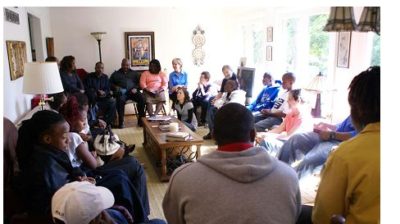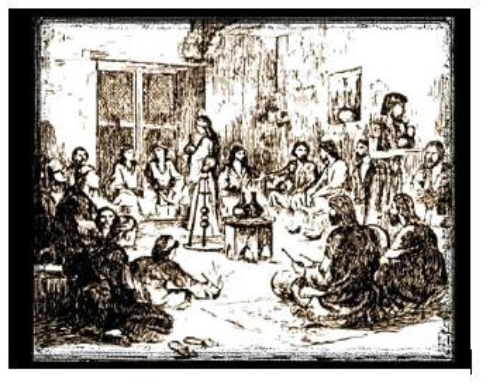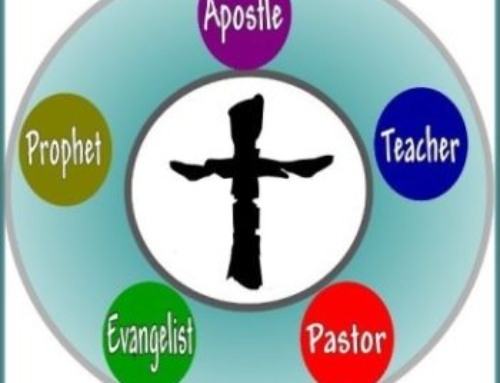If you have not read Part I & II, please do so here before proceeding further
In Part II of this article, we examined Acts 2:42 to see the second type of meeting not well known to the most of Christendom today. Let us proceed to another scripture:
- 1 Cor. 14:26 (KJV)
“How is it then, brethren? when ye come together, every one of you hath a psalm, hath a doctrine, hath a tongue, hath a revelation, hath an interpretation. Let all things be done unto edifying.”
When I was a much younger Christian, I used to argue vehemently that Paul must have been rebuking the Corinthian believers with this scripture. To me, it read, “How come, brethren, that every time you gather together, everyone wants to teach, prophesy, give an exhortation or sing a song? No, that would lead to lawlessness!” Of course, I had grown up all my life knowing only the setting where Christian gatherings were fully controlled by human leaders. The rest of us only do as we are told, when we are told: we shout hallelujah when told to, say amen when told to, sing and clap when told to, and pray when told to. So when you grow up in this kind of setting, how else would you interpret what Paul said?
However, having read this scripture again and again with an open heart in more than 15 different translations, I have come to conclude that my earlier position was an error in its entirety. Paul wasn’t rebuking the saints; he was actually setting a standard pattern which should guide the gathering of the saints. Let’s check just a few translations:
- NIV: What then shall we say, brothers? When you come together, everyone has a hymn, or a word of instruction, a revelation, a tongue or an interpretation. All of these must be done for the strengthening of the church.
- THE MESSAGE: So here’s what I want you to do. When you gather for worship, each one of you be prepared with something that will be useful for all: Sing a hymn, teach a lesson, tell a story, lead a prayer, provide an insight.
- COMPLETE JEWISH BIBLE: What is our conclusion, brothers? Whenever you come together, let everyone be ready with a psalm or a teaching or a revelation, or ready to use his gift of tongues or give an interpretation; but let everything be for edification.
- GOOD NEWS: This is what I mean, my friends. When you meet for worship, one person has a hymn, another a teaching, another a revelation from God, another a message in strange tongues, and still another the explanation of what is said. Everything must be of help to the church.
- TLB: Well, my brothers, let’s add up what I am saying. When you meet together some will sing, another will teach, or tell some special information God has given him, or speak in an unknown language, or tell what someone else is saying who is speaking in the unknown language, but everything that is done must be useful to all, and build them up in the Lord.
- AMP: What then, brethren, is [the right course]? When you meet together, each one has a hymn, a teaching, a disclosure of special knowledge or information, an utterance in a [strange] tongue, or an interpretation of it. [But] let everything be constructive and edifying and for the good of all.
Does this scripture need any further explanation? But even as explicit as it is, the 21st century mindset, shaped by 1800 years of religious tradition, will still rationalize it away:
Oh, it is not exactly that way; you know, it doesn’t really mean everybody is free to talk;
Perhaps this is only describing some informal gathering of believers etc.
Well, this should only happen once in a while. And even then, the pastor is in charge etc.
But remember that the letter was addressed to the entire “Assembly of God which is at Corinth together with all who in every place call on the name of Jesus Christ” (1 Cor. 1:2). It wasn’t written to just an informal clique in the Assembly; it wasn’t even written to the bishops, deacons and elders. And what’s more, this instruction, given to the Corinthian Christians is not for them only but also for “ALL WHO IN EVERY PLACE call on the name of Jesus Christ”. In other words, this principle is binding on all other assemblies as well. I ask you dear reader, if it was binding for them then, is it not so for us today?
Again, the human mind will argue, “But that will lead to confusion!” Now, here is a very sensitive matter and I wish you will be careful to understand what I am about to point out: there was already confusion, chaos and lawlessness among the Corinthian believers and that was exactly what Paul was trying to deal with! However, it wasn’t the open house meetings that created the confusion but the lack of it! You see, the default mindset of the early believers was that their local gatherings were an opportunity for real koinonia among brethren. But some overzealous brothers in the house began to tamper with that default arrangement by wanting to dominate meetings. Rivalry soon started among them as they went to great lengths to outdo one another. Little camps and sects began to form within the assembly and these sectarian leaders, in order to validate their own position over and above the others began to appeal to the authority of their idol-apostle. “I am of Paul!” “It was Peter that taught me this revelation, so you all had better receive it.” “Apollos is my own apostolic covering” and so on and so forth—that was the real source of the confusion!
So, to arrest this confusion, beginning with 1 Cor. 1:10-17, Paul then goes on in chapters 12 & 14 to insist that:
- Every one of the saints and not just a few have various gifts with which to benefit the entire body. (12:6-7)
- No one ministry is superior to another neither should ministry be dominated by a few individuals. All ministries are to be given expression for the building up of the entire body. To think or do otherwise is like the eye saying to the hand, you are not needed in the body. (12:21-25)
- In the local assembly, EVERYONE CAN ACTUALLY PROPHESY! (14:5,24,31)
- There should be so much mutual submission that if one is speaking and another receives a word, the first speaker should wrap it up and give the floor to his brother!
Can you believe that? I hope this question resonates in your heart right now: do we still have such meetings again in Christendom today? In fact, if you took time to read through 1 Corinthians 12&14, do we see anything that looks like one man presiding over the entire meeting? I am certain we wouldn’t. Indeed, the entire ministry being described in these two chapters is the second type of assembly meetings i.e. the meeting of the saints by the saints and for the saints – under the headship of Christ – our glorious Lord.
In the human mind, this arrangement is impossible and impracticable. True—as long as it is an assembly conformed to a human design. Such would continue to morph more and more into an incorporation where bigger is better and hierarchical structures and bureaucracy are indispensable. Ekklesia according to the divine design however is and functions as a family unit where Christ is the Head and all her members are happy to be brethren.






